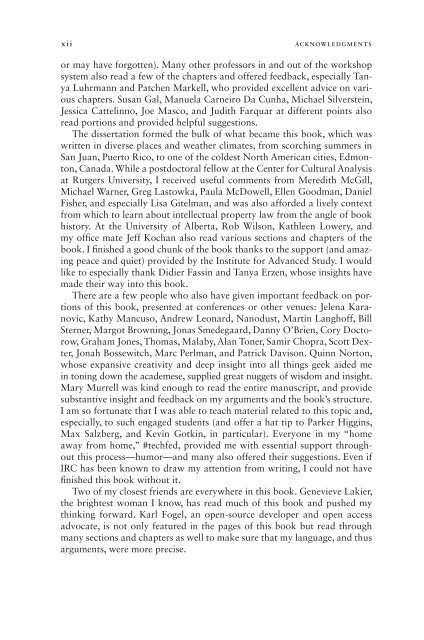V2TXZi
V2TXZi
V2TXZi
You also want an ePaper? Increase the reach of your titles
YUMPU automatically turns print PDFs into web optimized ePapers that Google loves.
xii ACKNOWLEDGMENTS<br />
or may have forgotten). Many other professors in and out of the workshop<br />
system also read a few of the chapters and offered feedback, especially Tanya<br />
Luhrmann and Patchen Markell, who provided excellent advice on various<br />
chapters. Susan Gal, Manuela Carneiro Da Cunha, Michael Silverstein,<br />
Jessica Cattelinno, Joe Masco, and Judith Farquar at different points also<br />
read portions and provided helpful suggestions.<br />
The dissertation formed the bulk of what became this book, which was<br />
written in diverse places and weather climates, from scorching summers in<br />
San Juan, Puerto Rico, to one of the coldest North American cities, Edmonton,<br />
Canada. While a postdoctoral fellow at the Center for Cultural Analysis<br />
at Rutgers University, I received useful comments from Meredith McGill,<br />
Michael Warner, Greg Lastowka, Paula McDowell, Ellen Goodman, Daniel<br />
Fisher, and especially Lisa Gitelman, and was also afforded a lively context<br />
from which to learn about intellectual property law from the angle of book<br />
history. At the University of Alberta, Rob Wilson, Kathleen Lowery, and<br />
my of� ce mate Jeff Kochan also read various sections and chapters of the<br />
book. I � nished a good chunk of the book thanks to the support (and amazing<br />
peace and quiet) provided by the Institute for Advanced Study. I would<br />
like to especially thank Didier Fassin and Tanya Erzen, whose insights have<br />
made their way into this book.<br />
There are a few people who also have given important feedback on portions<br />
of this book, presented at conferences or other venues: Jelena Karanovic,<br />
Kathy Mancuso, Andrew Leonard, Nanodust, Martin Langhoff, Bill<br />
Sterner, Margot Browning, Jonas Smedegaard, Danny O’Brien, Cory Doctorow,<br />
Graham Jones, Thomas, Malaby, Alan Toner, Samir Chopra, Scott Dexter,<br />
Jonah Bossewitch, Marc Perlman, and Patrick Davison. Quinn Norton,<br />
whose expansive creativity and deep insight into all things geek aided me<br />
in toning down the academese, supplied great nuggets of wisdom and insight.<br />
Mary Murrell was kind enough to read the entire manuscript, and provide<br />
substantive insight and feedback on my arguments and the book’s structure.<br />
I am so fortunate that I was able to teach material related to this topic and,<br />
especially, to such engaged students (and offer a hat tip to Parker Higgins,<br />
Max Salzberg, and Kevin Gotkin, in particular). Everyone in my “home<br />
away from home,” #techfed, provided me with essential support throughout<br />
this process— humor— and many also offered their suggestions. Even if<br />
IRC has been known to draw my attention from writing, I could not have<br />
� nished this book without it.<br />
Two of my closest friends are everywhere in this book. Genevieve Lakier,<br />
the brightest woman I know, has read much of this book and pushed my<br />
thinking forward. Karl Fogel, an open- source developer and open access<br />
advocate, is not only featured in the pages of this book but read through<br />
many sections and chapters as well to make sure that my language, and thus<br />
arguments, were more precise.


